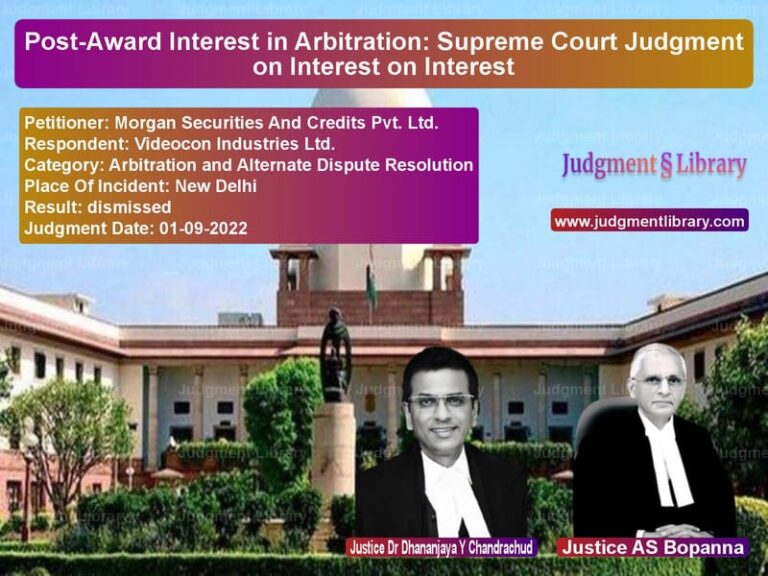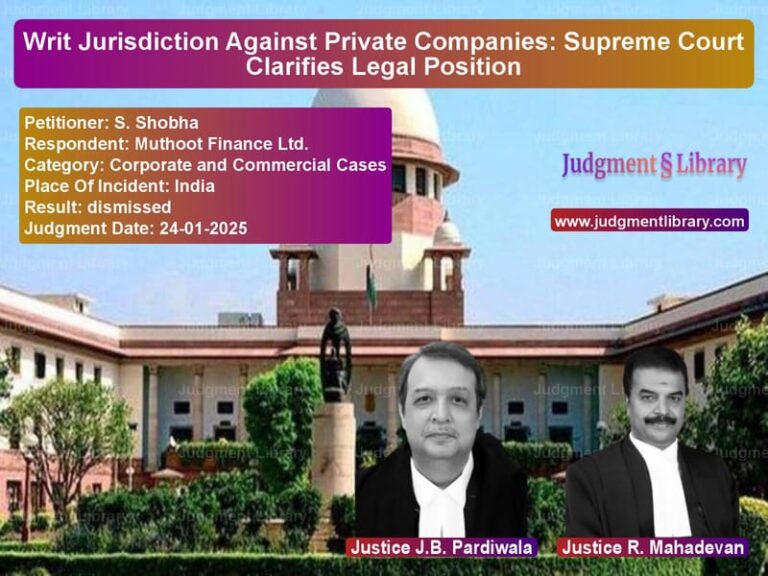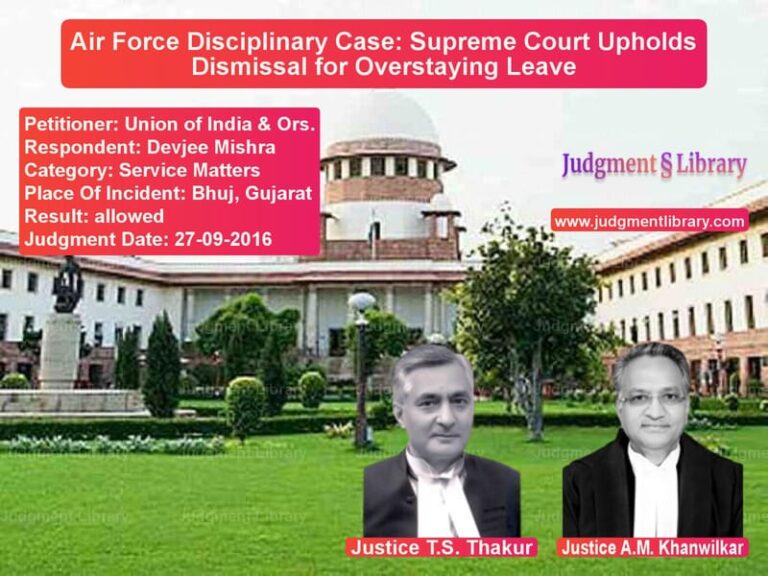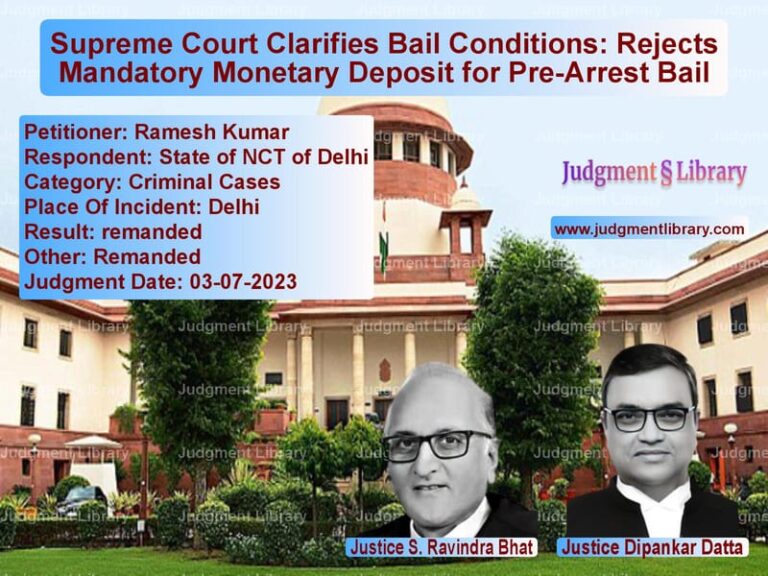Legal Validity of Unilateral Extinguishment Deeds: Supreme Court’s Landmark Judgment
The case of Satya Pal Anand vs. State of Madhya Pradesh & Ors. presents an important legal issue regarding the unilateral cancellation of land allotment by a cooperative society. The Supreme Court was tasked with determining whether an Extinguishment Deed could be registered without the consent of the affected party and whether the Sub-Registrar had the authority to approve such a document.
This case also raised crucial questions about the limits of writ jurisdiction and whether disputes of this nature should be addressed through alternative legal remedies. The Supreme Court ultimately upheld the decision of the Madhya Pradesh High Court, concluding that the writ petition was correctly dismissed and that disputes regarding cooperative societies should be settled within the framework of the Madhya Pradesh Cooperative Societies Act.
Background of the Case
The dispute originated from the cancellation of a land allotment made by the Punjabi Housing Cooperative Society in Bhopal. The appellant, Satya Pal Anand, claimed ownership of a plot that was originally allotted to his late mother in 1962. Following her death in 1988, the cooperative society unilaterally revoked the allotment, citing non-compliance with society bylaws.
In 2001, the society executed an Extinguishment Deed canceling the allotment and subsequently transferred the plot to another individual. The appellant contested this action, arguing that the society had no legal authority to unilaterally cancel the allotment without his consent. He also objected to the registration of the Extinguishment Deed by the Sub-Registrar.
Legal Proceedings
In response to the cancellation, the appellant pursued multiple legal avenues:
- Filing a dispute under Section 64 of the Madhya Pradesh Cooperative Societies Act: The appellant challenged the society’s actions before the Deputy Registrar of Cooperative Societies.
- Approaching the Sub-Registrar for cancellation: He sought to have the Extinguishment Deed and subsequent transactions annulled.
- Filing a writ petition under Article 226 of the Constitution: The appellant petitioned the Madhya Pradesh High Court to declare the Extinguishment Deed void ab initio.
The High Court dismissed the writ petition, ruling that the appellant already had an alternative legal remedy under the Cooperative Societies Act. It further held that the Sub-Registrar had no authority to cancel the registration of documents once they had been recorded.
Supreme Court’s Consideration
Due to conflicting opinions among the judges of the Division Bench, the case was referred to a larger Bench of the Supreme Court. The Court examined several key questions:
- Did the cooperative society have the legal right to unilaterally cancel the allotment?
- Was the Sub-Registrar justified in registering the Extinguishment Deed?
- Could the High Court have exercised writ jurisdiction in this matter?
- Did the appellant’s acceptance of compensation affect his claim?
Arguments by the Parties
Petitioner’s Arguments
The appellant, appearing in person, presented the following arguments:
- The society’s unilateral cancellation of the allotment was illegal and violated his constitutional right to property under Article 300A.
- The Sub-Registrar had no authority to register an Extinguishment Deed executed without his consent.
- The registration of the deed was fraudulent and should be declared void ab initio.
- The compensation he received under a compromise agreement was not a valid waiver of his ownership rights.
Respondents’ Arguments
The State of Madhya Pradesh and other respondents defended the society’s actions, arguing:
- The appellant had accepted monetary compensation and therefore had no standing to challenge the deed.
- The Sub-Registrar’s role was purely administrative, and he was legally bound to register documents meeting procedural requirements.
- The High Court’s decision was justified since the appellant had already invoked alternative legal remedies.
- The writ petition was an attempt to bypass statutory procedures.
Supreme Court’s Judgment
The Supreme Court upheld the High Court’s ruling, stating:
- The Sub-Registrar had no power to cancel registered deeds once they were executed.
- The cooperative society’s decision to revoke the allotment could be challenged only through the statutory mechanism.
- The appellant’s multiple legal proceedings indicated forum shopping.
- Registration of the Extinguishment Deed did not automatically confer validity on the transaction; its legality could be contested in appropriate forums.
The Court observed that the Sub-Registrar’s role was ministerial and not quasi-judicial. The registration of a document does not imply that its contents are legally sound—this must be determined in appropriate proceedings.
Analysis of the Judgment
Implications for Cooperative Societies
This judgment affirms that cooperative societies cannot unilaterally revoke property allotments without due process. The decision reinforces the principle that such disputes should be addressed within the cooperative framework.
Limitations of Writ Jurisdiction
The ruling clarifies that the High Court’s writ jurisdiction cannot be used to declare private transactions void when statutory remedies exist. This serves as a precedent discouraging parties from bypassing legal frameworks.
Role of the Sub-Registrar
The judgment reiterates that Sub-Registrars do not have the authority to adjudicate disputes regarding registered documents. Their role is limited to ensuring procedural compliance at the time of registration.
Conclusion
The Supreme Court’s decision in this case provides crucial guidance on property rights, registration of deeds, and the appropriate legal forums for dispute resolution. By upholding the High Court’s ruling, the judgment ensures that cooperative societies follow legal procedures while also protecting the integrity of the registration process.
This case serves as a significant precedent in Indian property law, reinforcing the principle that disputes must be resolved within the framework of established legal mechanisms rather than through extraordinary writ jurisdiction.
Don’t miss out on the full details! Download the complete judgment in PDF format below and gain valuable insights instantly!
Download Judgment: Satya Pal Anand vs State of Madhya Prad Supreme Court of India Judgment Dated 26-10-2016.pdf
Direct Downlaod Judgment: Direct downlaod this Judgment
See all petitions in Property Disputes
See all petitions in Contract Disputes
See all petitions in Landlord-Tenant Disputes
See all petitions in Judgment by Ranjan Gogoi
See all petitions in Judgment by Prafulla C. Pant
See all petitions in Judgment by A M Khanwilkar
See all petitions in dismissed
See all petitions in supreme court of India judgments October 2016
See all petitions in 2016 judgments
See all posts in Civil Cases Category
See all allowed petitions in Civil Cases Category
See all Dismissed petitions in Civil Cases Category
See all partially allowed petitions in Civil Cases Category







